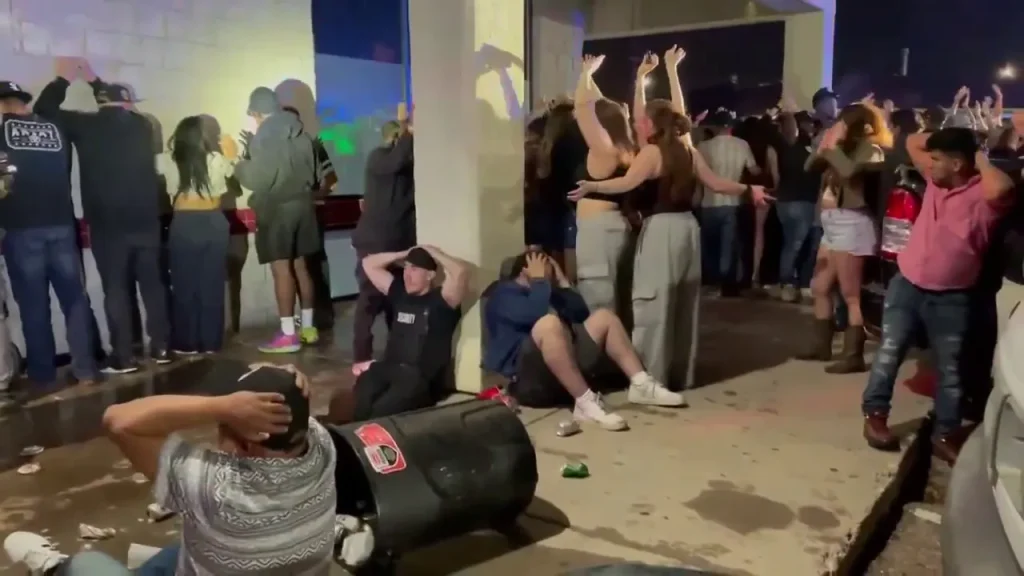In a significant law enforcement operation early Sunday, federal authorities detained over 100 illegal immigrants at an underground nightclub in Colorado Springs. This raid, which involved around 300 officials from multiple agencies, sought to address the growing concerns about gang-related activities linked to groups like MS-13. Not only were numerous immigrants apprehended, but authorities also uncovered drugs and firearms, further emphasizing the illegal activities occurring within the venue.
| Article Subheadings |
|---|
| 1) Overview of the Raid and Its Impact |
| 2) Key Agencies Involved in the Operation |
| 3) Nature of Criminal Activities Discovered |
| 4) Comments from Officials on the Operation |
| 5) Implications for Colorado’s Immigration Policies |
Overview of the Raid and Its Impact
The operation carried out in the early hours of Sunday was structured as a significant effort to tackle illegal immigration and related criminal activities in Colorado Springs. The Drug Enforcement Administration (DEA) led a multi-agency task force that managed to detain 114 illegal immigrants from a nightclub that was also reportedly a venue for gang-related activities. Beyond the arrests, the raid showcased the overarching concerns regarding law enforcement’s ability to maintain safety and order in areas experiencing high immigration-related challenges. The presence of over 200 individuals inside the nightclub at that time raised alarms about the extent of illegal gatherings occurring in the city.
Key Agencies Involved in the Operation
The highly coordinated operation included a variety of crucial agencies, demonstrating a broad collaborative effort to address a serious issue. The DEA took the lead, while other prominent agencies such as U.S. Immigration and Customs Enforcement (ICE), the FBI, and the Bureau of Alcohol, Tobacco, Firearms and Explosives (ATF) contributed to the operation’s success. Attorney General Pamela Bondi confirmed that about 300 officials participated in this action. The operation reflects ongoing efforts by law enforcement to combat not only illegal immigration but also the associated crimes that can arise in such contexts, especially in Colorado where loosened immigration policies have enabled criminal organizations to thrive.
Nature of Criminal Activities Discovered
During the raid, authorities uncovered a range of illicit activities beyond simply detaining illegal immigrants. Among the discoveries were various drugs, including pink cocaine, methamphetamine, and other narcotics. Additionally, several firearms were seized, underscoring the dangerous environment that characterized the nightclub. The DEA reported that evidence of prostitution was also found on the premises, painting a picture of a multi-faceted crime operation that extended beyond mere immigration violations. Such revelations force a reevaluation of what some might consider isolated incidents of illegal immigration and point to a larger, more complex web of criminality affecting the community.
Comments from Officials on the Operation
In the aftermath of the raid, various officials voiced their support for the actions taken. Attorney General Pamela Bondi praised the operation on social media, emphasizing the importance of addressing the threats posed by groups like MS-13 and their associated activities. She noted the significance of apprehending over 100 illegal immigrants in conjunction with the seizure of dangerous drugs. DEA Acting Administrator Derek Maltz also highlighted Colorado’s unfortunate status as a “ground zero” for violent criminal elements, advocating for stricter immigration policies as a means of reclaiming community safety. Comments from local police echoed these sentiments, focusing on making the community a safer environment a primary goal.
Implications for Colorado’s Immigration Policies
The ramifications of the raid touch the broader conversation on immigration policies within Colorado. Critics of lax immigration enforcement argue that such policies inadvertently support a climate where criminal gangs can operate freely, using the state as a “command and control” center for trafficking operations. As law enforcement contends with these challenges, there is a growing call for change in state and local immigration policies, invoking more rigorous measures to ensure that safety remains a priority. Local officials and advocates for stricter immigration laws argue that without a re-evaluation of these policies, areas like Colorado Springs could continue to struggle against not just illegal immigration but the corresponding levels of crime that come with it.
| No. | Key Points |
|---|---|
| 1 | Over 100 illegal immigrants were detained during the raid in Colorado Springs. |
| 2 | The operation involved agencies including the DEA, ICE, and local law enforcement. |
| 3 | Drugs, firearms, and evidence of prostitution were found at the nightclub. |
| 4 | Officials expressed concerns about Colorado’s immigration policies enabling crime. |
| 5 | The operation aimed to improve community safety amidst rising crime concerns. |
Summary
The massive raid at the underground nightclub in Colorado Springs marks a pivotal moment in law enforcement efforts to tackle illegal immigration and related criminal activities. With significant support from multiple agencies, over a hundred illegal immigrants were apprehended, along with various illegal substances and firearms. This operation reflects the ongoing challenges faced by Colorado regarding immigration policy and the need for stringent measures to ensure public safety against rising crime linked to gangs. As authorities advocate for reforms, the community remains on alert, keenly aware of the implications tied to such operations moving forward.
Frequently Asked Questions
Question: Why was the raid conducted?
The raid was conducted to detain illegal immigrants and address serious criminal activities, such as drug trafficking and gang-related crimes linked to groups like MS-13 in Colorado Springs.
Question: What types of illegal activities were discovered during the operation?
Authorities uncovered drugs including pink cocaine and methamphetamine, evidence of prostitution, and seized multiple firearms during the raid.
Question: Which agencies participated in the raid?
The operation involved the DEA, ICE, FBI, ATF, local police, and several other law enforcement agencies to ensure a comprehensive approach to addressing the issues in the community.


